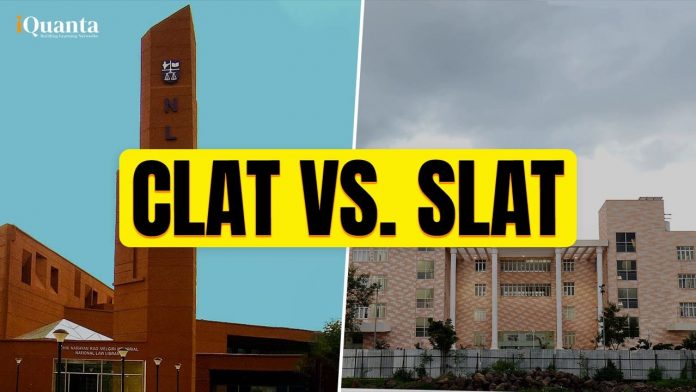CLAT Exam and SLAT Exam are two pivotal exams for candidates aiming to pursue a career in law or related fields. In this comprehensive guide on CLAT vs. SLAT, we delve into the intricacies of both examinations, providing students with a detailed comparison between the two.
This guide aims to assist students in their decision-making process by highlighting key differences, including syllabus content, examination structure, level of difficulty, and the opportunities each exam presents in terms of college admissions and career prospects. By understanding these distinctions, candidates can make an informed choice that aligns with their academic goals and career aspirations.

What is CLAT?
CLAT stands for ‘Common Law Admission Test’, which is the most significant law entrance exam in India. CLAT is a national-level entrance exam conducted by the Consortium of National Law Universities. Universities like the National Law Universities and National Law University Delhi, among other colleges, offer courses for admission to undergraduate and postgraduate law courses.
The Common Law Admission Test (CLAT) is utilized for entry into various law programs. Twenty-four National Law Universities (NLUs) accept CLAT scores for their 5-year LLB courses, while 21 NLUs consider them for LLB and LLM postgraduate courses. Other law colleges also use CLAT scores for undergraduate and postgraduate admissions.
The CLAT examination encompasses various segments such as English, Logical Reasoning, Current Affairs, Quantitative Techniques, and Legal Reasoning. The exam consists of 120 questions, is worth 120 marks, and must be completed in 120 minutes (2 hours).
Also Read : CLAT Preparation Strategy
What is SLAT?
SLAT stands for ‘Symbiosis Law Admission Test’, a common entrance exam for law organized by Symbiosis International University, aimed at students seeking admission into its legal education programs.
This includes both honours and regular BA LLB and BBA LLB courses available at its four legal institutions: Symbiosis Law School Pune (SLS Pune), Symbiosis Law School Hyderabad (SLS Hyderabad), Symbiosis Law School Noida (SLS Noida), and Symbiosis Law School Nagpur (SLS Nagpur).
A few other colleges also accept the SLAT score for their admissions. The SLAT examination includes various segments such as English, logical reasoning, legal reasoning, analytical reasoning, and general knowledge. The exam consists of 60 questions, totals 60 marks, and must be completed in 60 minutes.
CLAT vs SLAT: Exam Pattern
The CLAT exam is 120 minutes long; it’s a paper-based exam. The medium of the exam is English. The total number of questions is 120, and the total number of marks is 120. For every correct answer, you will be given 1 mark, and for every incorrect answer, 0.25 marks will be deducted. The syllabus contains topics like English, Logical Reasoning, Current Affairs, Quantitative Techniques, and Legal Reasoning.
The SLAT exam is 60 minutes long. The exam is conducted online. The medium of examination is English. The total number of questions asked in the exam is 60, and you will be given 60 minutes to solve them. For every correct answer, you will be given 1 mark, and there is no negative marking. The syllabus for the exam contains topics like English, Logical Reasoning, Legal Reasoning, Analytical Reasoning, and General Knowledge.
| EXAM FEATURE | CLAT | SLAT |
|---|---|---|
| Exam Duration | 120 minutes | 60 minutes |
| Exam Mode | Paper based | Online |
| Exam Medium | English | English |
| Syllabus | English Logical Reasoning Current Affairs Quantitative Techniques Legal Reasoning | English Logical Reasoning Legal Reasoning Analytical Reasoning General Knowledge |
| Total number of questions | 120 | 60 |
| Total number of marks | 120 | 60 |
| Marking scheme | +1 / -0.25 | +1/No Negative Marking |
CLAT VS SLAT: APPLICATION FEES
There is a difference in the application fee for both examinations.
For CLAT: Rs. 4,000 is for general/OBC/NRI/PWD/PIO/OCI/Kashmiri Migrants. Rs. 3,500 is for SC/ST and BPL candidates from SC and ST.
For SLAT: Rs. 2,250 + Rs. 1,000 is for all candidates.
| POINT OF COMPARISON | CLAT | SLAT |
|---|---|---|
| General/OBC/NRI/PWD/PIO/OCI/Kashmiri Migrant | INR 4000 | INR 2250 + INR 1000 (program fee) |
| SC/ST | INR 3500 | INR 2250 + INR 1000 (program fee) |
| BPL Candidates from SC and ST | INR 3500 | INR 2250 + INR 1000 (program fee) |
CLAT vs SLAT: ELIGIBILITY CRITERIA
When discussing about the CLAT vs SLAT examination, knowing if you are eligible for either or both the exams is important.
CLAT Eligibility Criteria
| CATEGORY | CLAT UG | CLAT PG |
| General/OBC/Specially-abled Persons (SAP) category | 10+2 with 45% marks | LL.B. or equivalent degree in law examination with minimum 50% marks |
| SC/ST | 10+2 with 40% marks | LL.B. or equivalent degree in law examination with minimum 50% marks |
SLAT Eligibility Criteria
| CATEGORY | SLAT UG |
| General/OBC/Specially-abled Persons (SAP) category | 10+2 with 45% marks |
| SC/ST | 10+2 with 40% marks |
CLAT vs SLAT: IMPORTANT TOPICS
While discussing about the CLAT vs SLAT examinations, we need to focus on covering the important topics.
| SUBJECT | CLAT | SLAT |
|---|---|---|
| English |
|
|
| Logical Reasoning |
|
|
| Legal Reasoning |
|
|
| Current Affairs/General Knowledge |
|
|
| Quantitative Techniques / Analytical Reasoning |
|
|
CLAT vs SLAT: Courses Offered
Check whether the courses offered in the CLAT vs SLAT exams align with your future goals or not.
SLAT Course Offered
| Colleges | COURSES OFFERED |
|---|---|
| Symbiosis Law School- SLS, Pune |
|
| Symbiosis Law School- SLS, Hyderabad |
|
| Symbiosis Law School- SLS, Noida |
|
| Symbiosis Law School- SLS, Nagpur |
|
CLAT UG Courses Offered
There are many colleges that offer legal courses for under graduation. They are mentioned in the table below.
| PARTICULARS | COURSES OFFERED |
|---|---|
| NLU Delhi, NLSIU Bangalore, NLU Hyderabad, NUJS West Bengal, HNLU Raipur, GNLU Gandhinagar, RMNLU Lucknow, RGNUL Panjab, CNLU Patna, NUALS Kochi, NLU Odisha, NUSRL Ranchi, NLUJAA Assam, DSNLU Visakhapatnam, TNNLU Tiruchirapalli, MNLU Mumbai, MNLU Nagpur, MNLU Aurangabad, HPNLU Shimla, DNLU Jabalpur, Dr B R Ambedkar NLU Sonepat, NLIU Bhopal, NLU Tripura, NLU Jodhpur, GNLU Silvassa, NUALS Kochi | Bachelor of Arts Bachelor of Law (BA LLB) Hons. |
| NLU Jodhpur, GNLU Gandhinagar, CNLU Patna, NLU Odisha, HPNLU Shimla, NLU Aurangabad, NLU Nagpur, | Bachelor of Business Administration (BBA) LLB Hons. |
| NUJS West Bengal, GNLU Gandhinagar, NLU Bhopal | Bachelor of Science (BSc) LLB |
| GNLU Gandhinagar, TNNLU Tiruchirapalli | Bachelor of Commerce (BCom) LLB |
| GNLU Gandhinagar | Bachelor of Social Work (BSW) LLB |
Also Read: NLU Fees for all the National Law Universities
CLAT PG Courses Offered
There are many colleges that offer legal courses for post graduation. They are mentioned in the table below.
| PARTICULARS | COURSES OFFERED |
|---|---|
| RMNLU Lucknow, GNLU Gandhinagar, HNLU Raipur, NLU Jodhpur, NUJS West Bengal, NLIU Bhopal, NLSIU Bangalore, RGNUL Panjab, CNLU Patna, NUALS Kochi, NLU Odisha, NUSRL Ranchi, NLUJA Assam, DSNLU Visakhapatnam, TNNLU Tiruchirapalli, MNLU Mumbai, MNLU Nagpur, MNLU Aurangabad, HPNLU Shimla, DBRANLU, Sonepat | Master of Law (LLM) |
| HNLU Raipur, NLIU Bhopal, NLSIU Bangalore, GNLU Gandhinagar, RGNUL Panjab, CNLU Patna, NLUJA Assam, TNNLU Tiruchirapalli, HPNLU Shimla, NUALS Kochi, MNLU Mumbai | Doctor of Law (LLD)/ PhD in Law |
| NLSIU Bangalore (Introduced in 2022), National Law University Odisha (Introducing in 2023) | Three-year LLB course |
| NLSIU Bangalore, NLU Odisha | Master of Philosophy (MPhil) degree |
CLAT vs SLAT: Difficulty Analysis
In the CLAT vs SLAT comparison, a key point of debate is the difficulty level of these exams. CLAT, with its broader syllabus, presents a more formidable challenge than the SLAT. This distinction is crucial for aspirants navigating their decision.
When looking into the CLAT vs SLAT situation, it’s clear that CLAT’s broader syllabus makes it known as the more challenging one. This difference is also shown in the number of seats: CLAT has 3,243 seats for its undergraduate program and 1,371 for its postgraduate courses. This is quite different from the 1,080 seats offered by SLAT.
When comparing the two, you have access to more number of law colleges compared to SLAT. Therefore, prepare accordingly to secure a place in a top college.
These two exams are crucial, students focusing on expanding their interests in the field of law should also explore other law entrance examinations. You can also read comparison between CLAT Vs AILET.
Also read: CLAT vs AILET
In conclusion, the debate between CLAT and SLAT centers on individual preferences and career aspirations. You must choose wisely, taking into account all aspects and what aligns best with your future objectives.
Where To Prepare From For CLAT?
If you are looking for structured CLAT preparation along with a 24*7 doubt-solving facility, you can rely on iQuanta’s CLAT Online Coaching.


